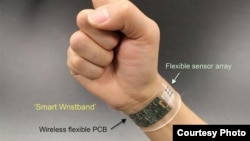As the popularity of wearable fitness trackers continues to grow, researchers are developing a sensor that can glean health information from perspiration.
Writing in the journal Nature, researchers from the University of California, Berkeley, have developed a “flexible sensor” which can measure metabolites and electrolytes in sweat. It also measures skin temperature and can send all the data wirelessly to a smartphone.
"Human sweat contains physiologically rich information, thus making it an attractive body fluid for non-invasive wearable sensors," said study principal investigator Ali Javey, a UC Berkeley professor of electrical engineering and computer sciences. "However, sweat is complex and it is necessary to measure multiple targets to extract meaningful information about your state of health. In this regard, we have developed a fully integrated system that simultaneously and selectively measures multiple sweat analytes, and wirelessly transmits the processed data to a smartphone. Our work presents a technology platform for sweat-based health monitors."
The data gathered by the device can offer insights into a person’s fatigue level, level of hydration and body temperatures.
Additionally, the sensor can measure “metabolites glucose and lactate, the electrolytes sodium and potassium, and skin temperature,” according to the researchers.
"Having a wearable sweat sensor is really incredible because the metabolites and electrolytes measured by the Javey device are vitally important for the health and well-being of an individual," said George Brooks, a UC Berkeley professor of integrative biology and a co-author on the study. "When studying the effects of exercise on human physiology, we typically take blood samples. With this non-invasive technology, someday it may be possible to know what's going on physiologically without needle sticks or attaching little, disposable cups on you."
The researchers say they plan to shrink the device and “ramp up” the number of things it can measure in sweat.
The researchers say the sensor could have applications beyond monitoring a workout.
"While Professor Javey's wearable, non-invasive technology works well on sweating athletes, there are likely to be many other applications of the technology for measuring vital metabolite and electrolyte levels of healthy persons in daily life," said Brooks. "It can also be adapted to monitor other body fluids for those suffering from illness and injury."
Here's a video about the tracker:





